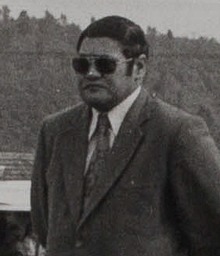Koro Wētere
Koro Wētere | |
|---|---|
 | |
| 34th Minister of Māori Affairs | |
| In office 26 July 1984 – 2 November 1990 | |
| Prime Minister | David Lange Geoffrey Palmer Mike Moore |
| Preceded by | Ben Couch |
| Succeeded by | Winston Peters |
| Member of the New Zealand Parliament for Western Maori | |
| In office 1969–1996 | |
| Preceded by | Iriaka Matiu Ratana |
| Personal details | |
| Born | 22 June 1935 |
| Political party | Labour |
| Relations | Nanaia Mahuta (niece)[1] |
Koro Tainui Wētere CBE (born 22 June 1935) is a former New Zealand politician. He was an MP from 1969 to 1996, representing the Labour Party.[1] He served as Minister of Māori Affairs in the Fourth Labour Government (1984–1990).[2] He is a member of the Ngāti Maniapoto tribe.
Member of Parliament
| Years | Term | Electorate | Party | ||
|---|---|---|---|---|---|
| 1969–1972 | 36th | Western Maori | Labour | ||
| 1972–1975 | 37th | Western Maori | Labour | ||
| 1975–1978 | 38th | Western Maori | Labour | ||
| 1978–1981 | 39th | Western Maori | Labour | ||
| 1981–1984 | 40th | Western Maori | Labour | ||
| 1984–1987 | 41st | Western Maori | Labour | ||
| 1987–1990 | 42nd | Western Maori | Labour | ||
| 1990–1993 | 43rd | Western Maori | Labour | ||
| 1993–1996 | 44th | Western Maori | Labour | ||
He was first elected to Parliament in the 1969 election as MP for the Western Maori electorate, one of the four Māori electorates in New Zealand's House of Representatives. Given Labour's traditional dominance in the Māori electorates, Wētere held his position without difficulty until his retirement at the 1996 election.
Cabinet minister
Wētere became Minister of Māori Affairs when the Labour Party won the 1984 elections.
Wētere was criticised during the Māori loan affair of 1985-86, and was nearly asked to resign. Tamati Reedy the head of Wētere's department Te Puni Kokiri attempted to arrange an unauthorised overseas loan for Māori businesses. Wētere was the subject of strong attacks over the issue by National Party MP Winston Peters, but denied any wrongdoing. When Labour lost power in the 1990 elections, Wētere returned to opposition for two terms before retiring from politics. Wētere was regarded as strongly belonging to the right wing of the Labour caucus, and was a strong ideological ally of Roger Douglas.
In 1990 Wētere refused to translate his addresses to parliament into English, having given them in Māori. This was one of a number of steps which pushed the issue of the use of Māori in public life during this time. There are now arrangements for simultaneous interpretation between English and Māori in Parliament.[3]
Post politics
The University of Waikato awarded Wētere an honorary doctorate for his contributions to the well-being and the advancement of Māori affairs in Aotearoa in 1999, and a lifetime award in 2008.[4]
Wētere was appointed a Commander of the Order of the British Empire in the 1996 New Year Honours, for services to the Māori people.[5]
References
- ^ a b "Low profile but leading". The New Zealand Herald. 26 November 1999. Retrieved 16 February 2010.
- ^ Gardiner, James; Bidois, Vanessa (29 April 2000). "Wetere tipped as Tainui head". The New Zealand Herald. Retrieved 16 February 2010.
- ^ Launch of Simultaneous Interpretation in the House
- ^ "University hosts celebration of Maori academic excellence". University of Waikato. 4 March 2008. Retrieved 16 February 2010.
- ^ "No. 54256". The London Gazette (Supplement). 30 December 1995.
